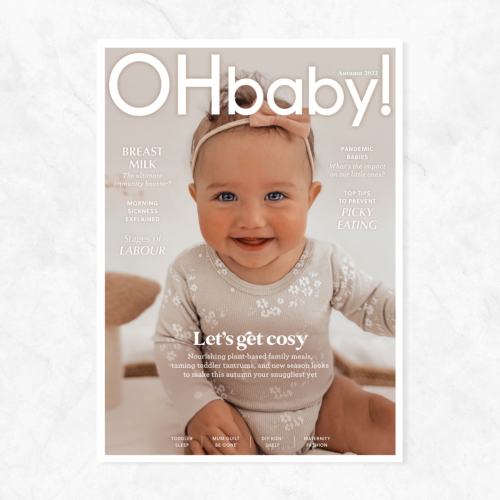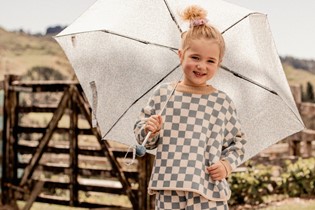10 tricks to taming toddler tantrums

Cinical psychologist Dr Melanie Woodfield gives us an insight into the mind of a toddler and shares her top ten tips of the trade.
Toddlers are tempestuous wee things – calm and sunny one moment, and stormy the next. But when toddlers have a tantrum, it’s almost always related to emotion dysregulation (‘big feelings’), rather than a strategic pre-planned act. Toddlers don’t tend to be calculating and conniving – they’re impulsive and reactive, and frustration or impatience can overwhelm their little systems in seconds.
Does that mean that you should back away with an “ah well” and abandon all expectations of little ones? Not at all. Limits, boundaries and consequences are actually really important for healthy child development: you’re ideally aiming for a balance of warmth and firmness in your parenting. But when parenting toddlers, your expectations and any consequences you choose to use need to take into account that early childhood is a time of intense emotional and behavioural development.
In supporting development, we need to be both a scaffold for our toddler to develop the skills necessary to be calm and to learn to listen, and a thermostat to help regulate their emotions. Every hot water cylinder needs a thermostat to maintain a temperature range – not too hot, not too cold. For toddlers, parents are their thermostat: at first, it’s all us. To an infant, we draw close, stroke, hug and murmur, saying things like “oh you’re sad, it’s okay, mummy’s here”, and this external version of self-talk helps baby to calm. As they grow, children are better able to be their own thermostat (with our support) until they reach a developmental stage where they can independently regulate their emotions and behaviour. An older child or adult usually has the ability to rationalise, use self-talk, and understand others’ intentions (“he didn’t really mean it”, “maybe I’ll get cake later”), which helps soften the blow of not getting cake now. But toddlers are in the moment.

So, bearing in mind a toddler’s still-developing abilities, here are some possibilities for taming those tantrums. First, remember that your attention is your super-power. Like gold to your toddler, it can be used to shape and encourage some behaviour over others. The challenge is to catch your wee one being good. “Good girl for waiting calmly”, “I love how you used your spoon!”, “Good asking”. Aim to praise the opposite of the ‘problem’ behaviour if you can. So if they’re calm (even briefly), praise calmness, gentle hands, sharing, taking a deep breath. A powerful double-whammy for gently shaping a child’s behaviour is to briefly ignore behaviour you’d like to see decrease, and praise what you can as soon as you can. So if a child is whining, you can briefly ignore that, praise how nicely they’re sitting in their car seat, and then (as soon as you can) praise them using their 'big girl' voice, or their quiet calm voice. This doesn’t work for biting, hitting or snatching – if your toddler grabs the iPad and you ignore it, they’re actually quite pleased.

Also, do the best you can to be consistent day-to-day, and between carers. Intermittent reinforcement is the term we give to a situation where a child is sometimes rewarded (intentionally or accidentally) for a behaviour, and sometimes not. For example, they throw a tantrum one afternoon and get handed the fruit bar they wanted, as Mum’s busy with baby. The next day’s tantrum gets a stern talking to and no snack. But a tantrum later that night gets a sigh from Mum and the long-awaited biscuit. Consistency can be really, really tough, but it’s worth the effort. If an intermittent reinforcement situation evolves, it is a powerful driver for your wee one to persist with the behaviour that sometimes gets a reward. This is why sensible adults find it hard to resist the allure of pokie machines – sometimes you get rewarded, you don’t know when it’s coming, but it’s worth pressing that button over and over just in case.

Finally, just to say – if you’re tired, depressed, or stressed, it’s tough to model and support emotion regulation to your wee one. Parenting small children is one of the more stressful phases of the family life cycle. And your wellbeing as a parent is oh so closely related to your child’s wellbeing. You’ve likely noticed that there’s a relationship between adult snappiness and child stroppiness that goes both ways. Like a metal detector, they have an uncanny ability to pick up when you’re tired, hormonal or stressed. But remember: you don’t need to be 'on' 24 hours a day. Being present, having a neutral face (if a smile feels too hard that day), and responding as best you can is good enough on the hard days.
Young children can’t read your mind – they can only read your touch, your words, and your tone.
Of course parenting effectively is easier when you’re well rested. And it doesn’t go away when you’re not. So it’s worthwhile filling your kete or toolkit with a collection of strategies that can be grabbed at a moment's notice. And remembering that this too shall pass.

TOP 10 TIPS FOR TAMING TODDLERS
- COVER THE BASES
Remember the basics: not too tired, not hungry, not wet. If a toddler is exhausted, they’re not capable of calm, rational thought. Prolonged negotiation and reasoning won’t get you far until these needs are met.
- GIVE THEM OPTIONS
Thinking about what your child can be in charge of or have control over can help lessen outbursts a little. “Would you like a big spoonful of peas, or a small spoonful of peas?” (peas are compulsory, but they choose lots or a little bit). “Would you like to hold this hand, or this hand?” (holding an adult’s hand is expected, but they can choose which). If you have the energy, a little silliness can help distract a child who is prone to trying to negotiate: “If I were you I’d choose this hand, as this one is freezing cold!" (cue the tickles). Or “Shall we stomp to the car like dinosaurs or like elephants?”.
- SPEAK THEIR LANGUAGE
If your child is constantly demanding snacks or devices, try to anchor things to concrete events – young kids aren’t great with abstract concepts like time, so “You can have one after Peppa Pig finishes” or “after your sleep” is better than “later” or “at 3 o’clock”. Keep explanations brief. With short attention spans, toddlers lose track quickly. Repetition or a ‘broken record’ can also help – calmly and briefly repeating the same message (“Raisins after sleep time”). As can simple “when… then…” statements. “When you’re sitting quietly, then I’ll bring your apple”, “When dinner is finished, then you can have the yoghurt”. You may need to repeat these statements calmly five or six times – each time they ask if they can have the yoghurt, just repeat the statement and don’t engage in an extended conversation.
- CHANGE TACK
Intervene quickly and distract, ideally before the big feeling sets in. One way is to change or up the ante on how animated and engaging your facial expression and tone of voice are. Short sentences, animated tone, eye contact or physical closeness. Distraction is always an option – if a tricky nappy change is looming, put on an uber-excited voice and chat animatedly about tonight’s dinner or the family cat.
- PICK YOUR BATTLES
The time to work on a child’s listening skills and ability to tolerate disappointment or frustration is not when you’re at a large family reunion. It’s when you’re at home, your toddler is rested and fed, and you’re also rested and fed. Tell yourself you’re 'training up' his ability to tolerate/sit with disappointment (sadly, a reality of life for us all), which might help sustain you when the meltdown begins. If you’re out in public, pre-plan or pre-empt high stakes interactions. For example, telling your toddler ahead of time that if she stays nice and calm when leaving the swimming pool, she can choose the song to play in the car on the way home, or have a box of raisins.
- VALIDATE THEIR EMOTIONS
When the tears start, label their emotions – this builds a child’s emotional vocabulary. Then validate: “You’re disappointed that you can’t have chips. It’s hard to wait”. Validate the emotion, but not the behaviour if it’s not okay (emotions can always be validated, behaviour not always). If the “Pleeease” or “It’s not fair!” start, briefly repeat a short, calm “It’s hard to wait, I know.”
- BE KIND BE FIRM
If hitting or biting happens in the midst of ‘sitting with’ disappointment or frustration, you might choose a different response. Emotions are raging, and it’s not the time for a long chat about how hitting is inappropriate. Stick gently to the limit of no snack and follow up the hitting with a short chat and consequence when he’s calmed down. Discipline is all about teaching and learning, and it’s hard to learn well when emotions are raging.
- MAKE INSTRUCTIONS FUN
When you’d like a child to do something, you have options. One option is a direct command (“Please get your shoes”), but you can feel very stuck indeed when wee cherub doesn’t comply, and others have overheard you give the command. The good news is you have other options – keep the direct commands for when they’re really needed (think “Come here now!” when a child is near the road). Another option might include timing or races (“Oooo how fast are you? Can you get your shoes before I get mine?”). Or giving a choice instead (where possible). Or choose to use distraction (whisper when they least expect it, or talk in a funny voice) while simply scooping them up and moving to where they need to be.
- INDULGE THEIR WISH USING IMAGINATION
Another option is “I wish…” statements. Toddler demands ice cream, you explain that we have ice cream tomorrow with Grandma, toddler replies, “But I want ice cream NOW!”. One option is to get a little silly with it: “I wish we could live in an ice cream house and then we could eat the walls!”. Wee ones sometimes forget their indignation, and join in with “Yeah, and I could have an ice cream bed!” and this offers the chance to distract and change the subject.
- KNOW WHEN TO USE TIME OUT
How young is too young for time out? It’s generally not recommended for kids under around two and a half, as they lack some of the key developmental skills they need for this process to be effective and safe.
As well as being a mum to two almost-teen boys, Dr Melanie Woodfield is a clinical psychologist and researcher in Auckland. Those long days parenting toddlers are still fresh in her mind, and raisins still live at the bottom of her bag.

AS FEATURED IN ISSUE 57 OF OHbaby! MAGAZINE. CHECK OUT OTHER ARTICLES IN THIS ISSUE BELOW

















